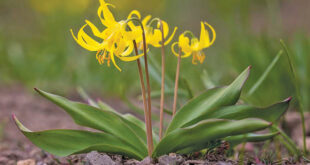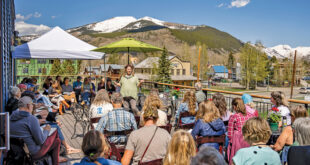
Part one: How our community radio station is meeting the challenge of change
By Richard Kadzis
It’s Friday afternoon in the Gunnison Valley, and there’s a palpable levity hanging in the air. Or, should I say resonating over the air?
“TGIF to all our listeners, near and wide,” exclaims KBUT FM disc jockey Bob Brazell through his on-air mike. “We’re broadcasting from a rarified 8,885 feet above sea level, and how many radio stations can say that? It’s time to celebrate another weekend; heck, let’s celebrate life!”
Brazell’s Friday afternoon “Lonesome Bob” show on KBUT is a long-running staple on the airwaves of this ever-curious, non-commercial, community radio station that captures the mystique of living in the high altitude of the Colorado backcountry.
He’s been quipping about KBUT’s unique positioning ever since the days of its precursor, Earth Station Radio, a local access channel, transmitted over the area’s first cable TV system starting in the 1970s.
“KBUT conveys an experience many listeners live every day in West-Central Colorado, or that many aspire to live,” Brazell observes. “Our love for the creative, our music, dance, visual arts, theater, festivals and of course outdoor sports each embody a way of living not found in too many places, except here, for one. KBUT is an ambassador for all that, and more.”
It’s a lifestyle counter to the culture, the daily grind and gridlock of media-heavy metropolitan areas, one that has been expressed through KBUT’s diverse array of music, arts, news, public affairs and other programming since its FM signal first went live in December 1986.
That means KBUT turns 30 years old this year, but don’t think for a moment that it’s approaching middle age.
“KBUT is still an adolescent,” insists station general manager Julia Brazell, one of Lonesome Bob’s daughters. Because the station’s colorful character makes it a media anomaly, its evolutionary state toes a line between being a cutting-edge innovator and a fragile nonprofit.
The station, formed and based in Crested Butte, eschews corporate sponsorship as much as the town blocks big box retailers, fast food chains and the commercial glare of neon in favor of its status on the Federal Historic Register. Instead, the station’s loyal base of underwriters, consisting of locally-owned and mainly small businesses, is central to its financial model, as are contributions from member-listeners.
“KBUT is listener-supported and volunteer-powered,” Julia Brazell adds. Its reliance on grass-roots funding is boosted by matching annual grants from the Corporation for Public Broadcasting (CPB), which recently mandated that every one of the nearly 800 community radio stations in America must now increase their non-federal financial support (NFFS) to continue receiving CPB matching grants.
The funding mandate, however demanding, places KBUT in a time of disruptive change, much akin to the turbulence of a teenager learning real world survival skills.
Best in class performer confronts new funding pressure
If KBUT’s life stage is currently that of a teenager, Brazell could argue the case for a child prodigy. That’s because the station is one of only 404 community outlets to receive matching CPB funds, as compared to the total 776 community stations nationally, according to the National Federal of Community Broadcasters (NFCB).
The station has sustained the matching grant for multiple consecutive years, which adds up to a “best in class” performance, placing KBUT in the upper echelon of community stations known for high quality, comprehensive programming and consistently sound operations.
Another performance metric in support of the best in class claim: “More than 60 percent of our population tunes in to KBUT on a weekly basis,” reports Tyler Lucas, KBUT’s director of development, based on a listenership study done with National Public Radio. “That’s over 9,000 pairs of ears.”
The station’s strength lies within the listeners, who donate on an individual level, often through two pledge drives. The summer drive will start August 1, Lucas says. More than 160 underwriters, all of them local companies, augment the cash contributions, representing about one-third of the KBUT annual budget.
Still, as one of the 445 rural community radio stations in America, KBUT confronts a charitable-giving economy of scale that’s far more finite than the economic bases of the nation’s 310 urban community stations.
“With the more stringent requirements from the CPB, we will need to raise $100,000 more annually to maintain our current operating standards,” Julia Brazell notes.
Locals and visitors alike
KBUT’s standards are higher than many other community stations, resulting in a rich diversity of programming
starting with virtually any musical genre imaginable, all delivered by more than 50 regular and fill-in volunteer DJs. It extends to a broad range of local, state, national and global information channels including National Public Radio.
Beyond the rich scope of 24/7 programming and on-air content, there is reach. KBUT broadcasts at 90.3 FM in Crested Butte/Mount Crested Butte, 88.7 FM in Gunnison, and between both locations at 94.9 FM in Jack’s Cabin. As important, the station frequencies are also accessible through online streaming over KBUT.org.
“KBUT is essential to locals and intriguing to visitors,” notes Karen Choate, a summer resident of Mt. Crested Butte. In fact, seasonal residents and visitors alike find the station’s homespun flavor so appealing, they keep listening online. Lonesome Bob, for example, often hears from remote audience members in Australia, where community radio also thrives.
According to Julia Brazell, 30 percent of all listeners reside outside of the Gunnison Valley, and 25 percent outside of Colorado.
Next week we will look at the generational connections associated with KBUT.
About the author: Story author Richard Kadzis is a former New England correspondent for NPR’s All Things Considered based at WBUR-FM in Boston and a cofounder of WCNI-FM, a community radio station on the campus of Connecticut College. He is also a commentator for NPR member station KRWG-FM at New Mexico State University. Kadzis is also a regular DJ at KBUT-FM, where he is known as the Buzzman.
 The Crested Butte News Serving the Gunnison Valley since 1999
The Crested Butte News Serving the Gunnison Valley since 1999



